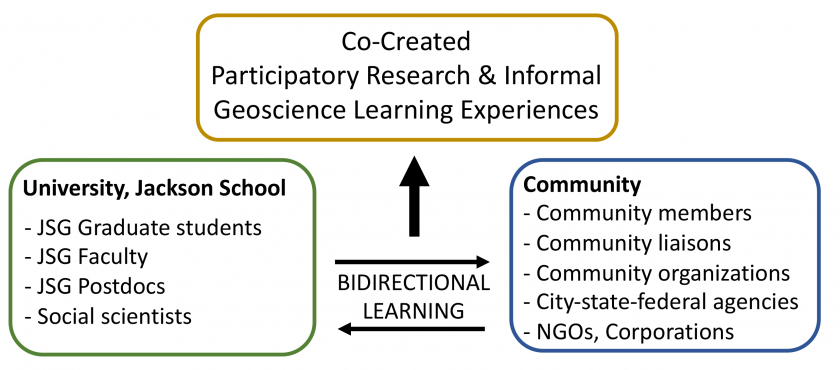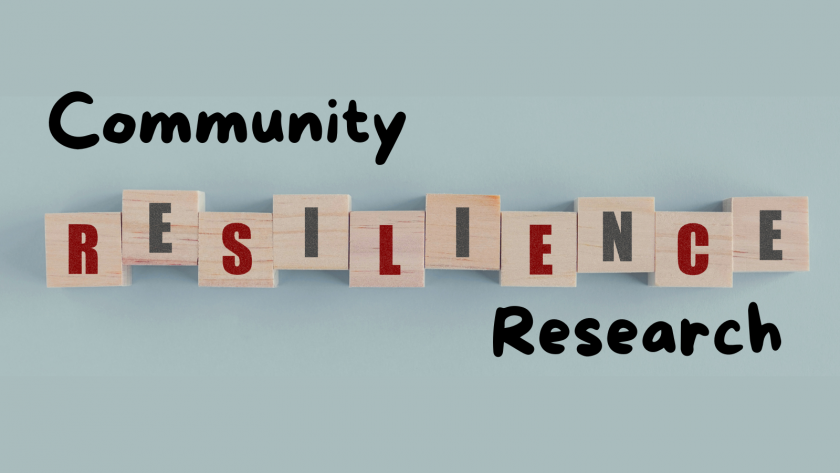CRESSLE
The Environmental Science Institute has been awarded a five-year grant from the National Science Foundation to partner geoscience researchers and Austin community members to address issues of community resilience. The grant is a collaboration involving faculty from the University of Arizona, as well as faculty and researchers from the Jackson School of Geosciences, the Moody College of Communication, the College of Liberal Arts, Dell Medical School, the LBJ School of Public Affairs and local community organizations and other stakeholders, including People Organized in Defense of Earth and Her Resources (PODER).
Project CRESSLE, Community Resilience integrated into an Earth System Science Learning Ecosystem, will partner UT researchers with communities from Austin neighborhoods to assess community needs, and create a community of practice that will design and implement community-driven research projects addressing community resilience and sustainability challenges. Projects will address resilience via four research themes: Water Resources, Climate Resilience, Communities and Land Use, and Air Quality.

University researchers, community members and community partner, PODER, are part of the Project CRESSLE team.
For additional information about CRESSLE, please contact us at esi@esi.utexas.edu.
For information for prospective graduate students, please select the “Prospective Graduate Students” tab.
Project CRESSLE will tackle community-based problems affecting underresourced neighborhoods in Austin. Project selection and co-design of research will be based on input from cohorts (UT geoscience researchers, Austin community members and community organizations) and an analysis of issues of greatest community need. Participatory Research Projects will be developed across four research themes – Water Resources, Climate Resilience, Communities and Land Use and Air Quality.
Water Resources

Projects in this cohort will address three main water-quality resilience challenges that may disproportionately affect underresourced communities in east Austin. These are impacts on 1) water quality of the Colorado River by activities of upstream and local users, 2) water quality of local watersheds that drain to the Colorado River, from rapid urbanization, and aging municipal infrastructure.
Climate Resilience

Projects will focus on two key climate challenges faced by urban communities: extreme heat and extreme precipitation/flooding. Key elements include: 1) assessing the exposure of climate impacts, such as heating or rainfall across a city, as a function of atmospheric forcing, geography and landcover; 2) assessing social vulnerability of communities to understand how the same forcing can have disproportionate impacts across urban areas; and 3) investigating strategic solutions by aligning downscale geophysical data and social indicators of community resilience.
Communities & Land Use

Projects will address resilience challenges associated with land-use change, with implications for the value of civic green spaces, and food and water resource resilience. The geoscience approaches will involve geospatial and remote sensing analysis, and geochemical analyses of water and soil. These data will be used to study landscape changes, water quality and quantity, and soil quality.
Air Quality

Projects will focus on monitoring the air quality in underresourced communities in Austin and nearby regions, especially those impacted by identified industrial growth and associated operations. The monitoring locations will be identified through a participatory approach, and communication efforts will be developed and maintained to share findings with community members.
Postdoctoral Fellows will be recruited nationally to work with faculty, graduate students, community members, and community organizations to co-develop and conduct participatory research projects around the research areas (Water Resources, Climate Resilience, Communities & Land Use, and Air Quality).
Project CRESSLE Opportunities for Graduate Students

Prospective graduate students interested in applying geoscience to community resilience research can join Project CRESSLE. Graduate students will work with faculty via four research themes: Water Resources, Climate Resilience, Communities & Land Use or Air Quality.
Graduate students participating in Project CRESSLE will:
- Develop science communication skills
- Work in resilience and sustainability research
- Develop community-engaged participatory research projects
Visit the Research Themes page to connect with faculty involved with Project CRESSLE.
Jackson School of Geosciences

The graduate program at the Jackson School is top-ranked program geoscience program in the United States. Our program offers unmatched breadth and depth in education and research opportunities. Find out more details about the graduate program here.
Graduate Portfolios

Graduate portfolio programs provide opportunities for enrolled graduate students to obtain transcriptable credentials in cross-disciplinary academic areas of inquiry while they are completing the requirements for a master’s or doctoral degree in a particular discipline. Portfolio programs promote cross-disciplinary scholarship and study by bringing together faculty and students from a variety of disciplines whose interests transcend boundaries of traditional academic disciplines. Find out more about UT’s Portfolio programs here.
Career Resources

Career and academic research resources:
- Demystifying the Academic Research Enterprise
by Kelvin K. Droegemeier
